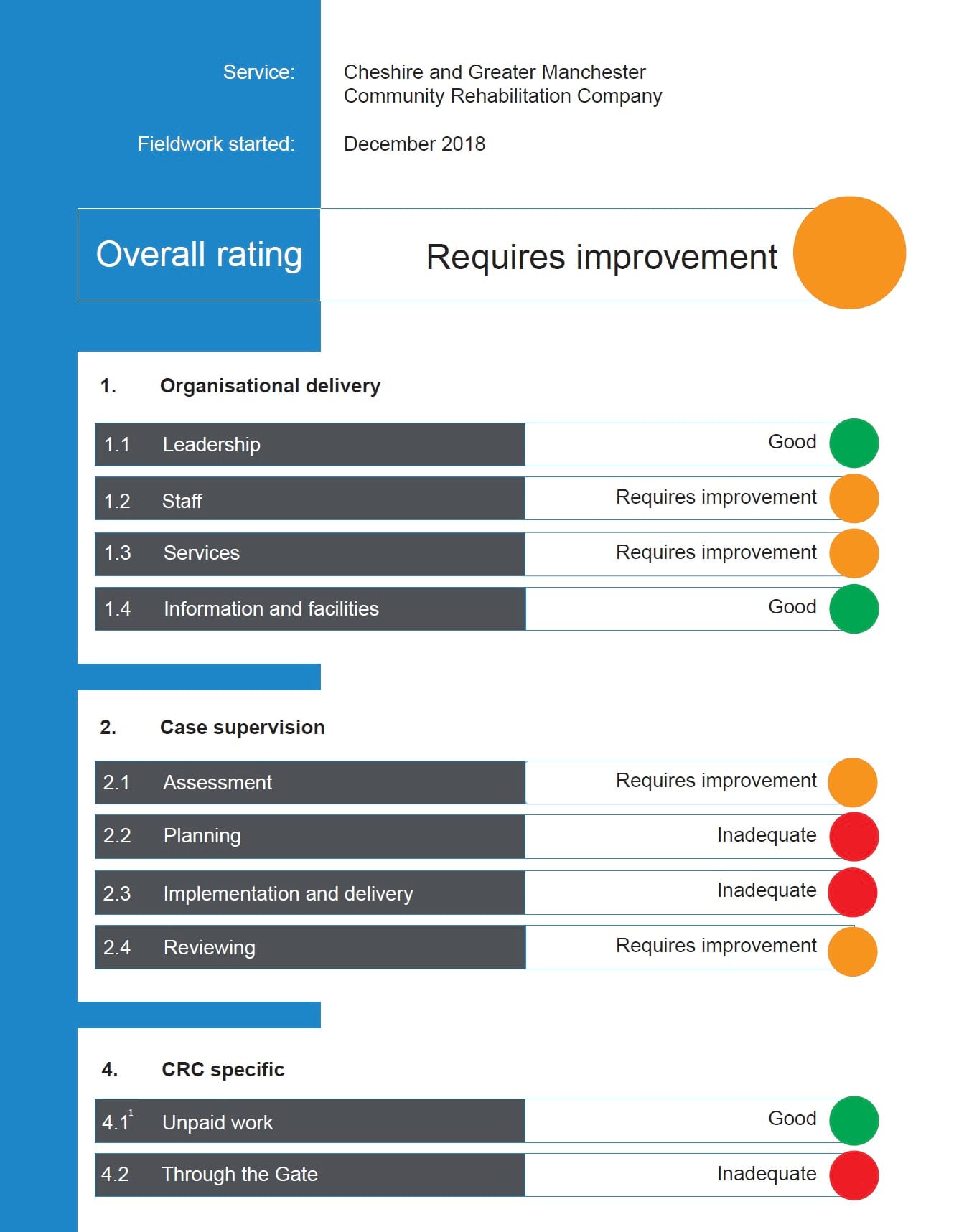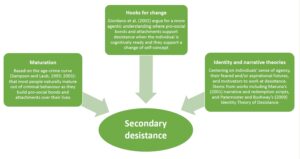Public protection work unsatisfactory
Cheshire and Greater Manchester Community Rehabilitation Company (CGMCRC) was assessed by probation inspectors as ‘Requiring improvement’, the second lowest rating, in a new inspection report published today (3 April 2019).
Inspectors praised strong leadership and hard work by staff but said these were yet to translate into effective work to protect victims from harm.
Publishing the fourth report in 2018-19 on a CRC owned by the Purple Futures group, Dame Glenys Stacey, HM Chief Inspector of Probation, said it was not surprising to find themes similar to those identified in previous reports. However, Dame Glenys added:
It is disappointing to learn that so little has improved since our last visit in 2016. The CRC’s operating model and organisation structure have been designed to enhance opportunities for rehabilitation and to reduce reoffending… However, despite an ongoing campaign by senior leaders to keep the profile of public protection high, they have been unable to embed a culture that recognises and responds effectively to the need to keep people safe from harm.
Weaknesses in work to protect children were particularly highlighted.
Inspectors assessed that the “risk of harm to others was underestimated in too many cases” and that “the quality of planning was variable; plans lacked important detail, especially about how the CRC would keep people safe.”
Resourcing restraints beyond the CRC’s control had led to structural and policy changes. CRC leaders remained positive and worked hard to introduce and embed change, and drive improvement. “However, many practitioners feel overwhelmed by the pace of change and unable to meet the demands of the CRC’s expectations. There is a growing divide between the strategic aspirations of the CRC and the reality of practice. We have seen this in other Purple Futures CRCs,” Dame Glenys said.
The report noted that staff managed “heavy and complex workloads within an environment of constant change”. Staffing levels have reduced by a quarter since 2014 and some teams across the large and complex CRC were managing “far too many” cases.
Some supervised cases “beyond their competence and without the necessary support”. Some were ill-equipped to handle cases involving complex child safeguarding issues and work to address domestic abuse by men was inadequate. Inspectors found that some were “extremely distressed” by their workloads.
Dame Glenys added:
No matter how good a senior leadership team is, it is the effectiveness of case management that makes the difference to people’s lives. Currently, despite pockets of careful, competent practice, there is too much variation in the quality of case management. The CRC needs to do far more to protect victims and the public and to make sure the individuals with whom it works change their offending behaviour.
Inspectors did, however, have confidence in the leadership and staff to address weaknesses. The report noted:
The CRC has a strong leadership team that demonstrates its commitment to quality probation services, its staff and other stakeholders. The ongoing investment with partners, providers and other stakeholders has helped create effective initiatives and interventions. The quality assurance framework provides a fully comprehensive system for driving improvements in policy and practice.
Key findings
Inspectors organised their key findings under three main headings: organisational delivery; case supervision and unpaid work & through-the-gate.
Organisational delivery
Inspectors’ main findings on this domain were mixed.
- Leaders work professionally and competently to provide good-quality services that reduce reoffending, protect the public and fulfil the sentence of the court.
- The CRC’s approach to supporting the work and wellbeing of its staff does not sufficiently meet the needs of practitioners who are managing heavy and complex workloads within an environment of constant change.
- The CRC works hard at a strategic level to provide equality of access to effective services and interventions but, at practice level, there is considerable variation in the quality and quantity of interventions available across Cheshire and Greater Manchester.
- The CRC embraces opportunities to understand and improve performance in all areas, including facilities, but information and communications technology (ICT) does not support consistently effective practice.
Case supervision
Inspectors were generally dissatisfied with the quality of case supervision:
- Assessments were recorded well but there was not enough analysis of offending behaviour.
- Risk of harm to others was underestimated in too many cases.
- The quality of planning was variable; plans lacked important detail, especially about how the CRC would keep people safe.
- Practitioners maintained a good focus on encouraging the engagement and compliance of those under supervision but failed to give adequate attention to work to support desistance and keep others safe.
- Most case reviews were less than thorough; changes were not always recorded well nor led to adjustments to plans.
Unpaid work
Inspectors were pleased with the quality of unpaid work provision:
- There is an effective strategic approach to unpaid work; a broad range of placements were used well to encourage skills development but enforcement processes need strengthening.
Through-the-gate
Inspectors were disappointed at the quality of through-the-gate work:
- Through the Gate practice is poor; there is insufficient planning and resettlement work to support desistance and keep people safe and too little coordination between pre- and post-release work.
Conclusion
The Probation Inspectorate works on a four-band rating system: excellent, good, requires improvement and poor. This is the twelfth inspection of a CRC under the new rating system and eleven areas have been rated in the second to lowest band: “requiring improvement”, the only exception being the even worse “inadequate” rating given to the Dorset, Devon & Cornwall CRC when it was run by the now defunct Working Links.
I have been compiling an unofficial league table of probation performance based on the inspectorate’s ratings. The table has been updated today and shows Cheshire & Greater Manchester CRC as one of the poorest performing CRCs.
It is disappointing, if not surprising, that CRC performance has not improved despite many areas now undergoing their second inspection. The fact that contracts are ending early next year with the new specification still to be announced makes this an uncertain time for those operating, working in and being supervised by Community Rehabilitation Companies.










One Response
ah once again leadership is good, nothing to do with them, its the plebs fault